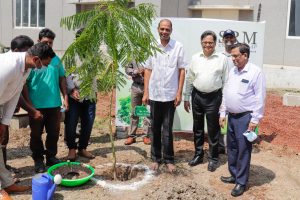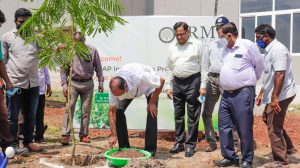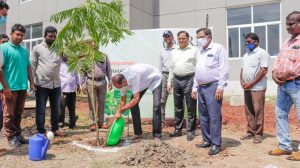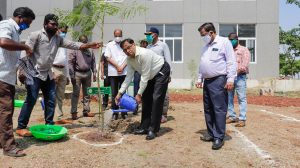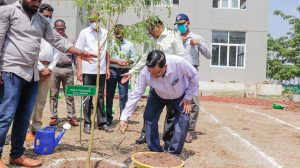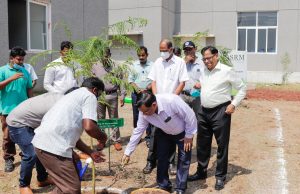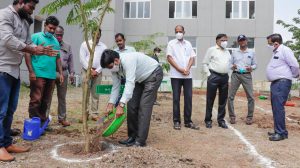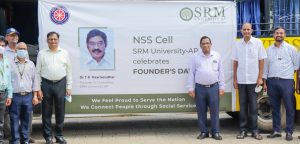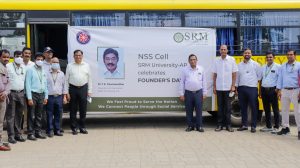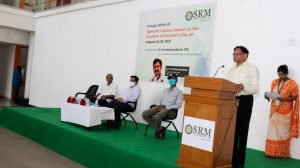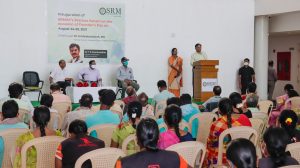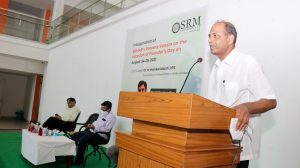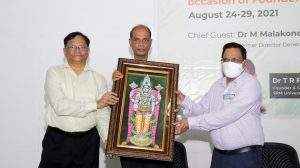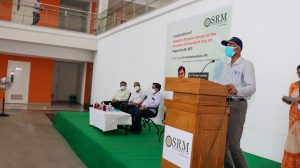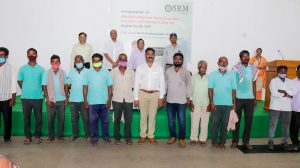All Management Events
- In conversation with Ms Koka Vijayalakshmi August 26, 2021
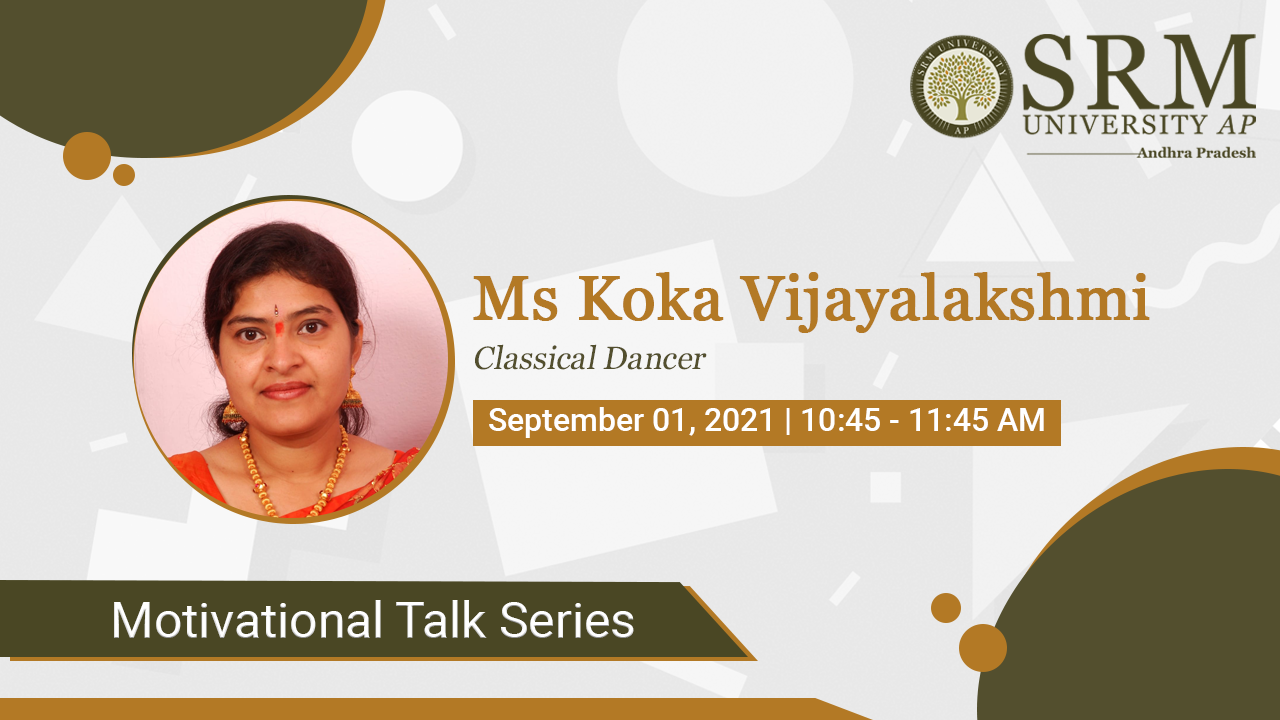 SRM University-AP, Andhra Pradesh, unifies to welcome Freshmen of the academic year by inviting Ms Koka Vijayalakshmi, Classical Dancer, to deliver an inspiring speech on September 04, 2021, at 10.45 am.
SRM University-AP, Andhra Pradesh, unifies to welcome Freshmen of the academic year by inviting Ms Koka Vijayalakshmi, Classical Dancer, to deliver an inspiring speech on September 04, 2021, at 10.45 am.Ms Koka Vijayalakshmi was born into a Telugu family with a passion for fine arts. At the age of 5, she began learning Kuchipudi. Ms Vijayalakshmi holds an MA in Kuchipudi dance from PST University, Hyderabad and an M. Phil in Tourism Management. She is also pursuing her PhD in Dance. She has given more than 1000 performances in India and abroad.
Ms Koka Vijayalakshmi is an Empanelled Artiste of the Indian Council for Cultural Relations (ICCR). Koka Vijayalakshmi partook in many Festivals in India and abroad and has over 1000 performances to her credit. She has further choreographed celebrated dance ballets with thematic and innovative presentations.
A Doordarshan Graded Artiste, Koka Vijayalakshmi, is dedicated to promoting dance in Andhra Pradesh and Telangana. She set up the Sri Koka Radha Krishna Murthy Academy in memory of her father. This Academy promotes the Rich Indian Culture & Heritage through Indian fine arts in both Telugu-speaking States.
Ms Vijayalakshmi has also released a rare book, “Bhogini Dandakam”, written by Sri Bammera Pothana and five Dance ballets in 2011 titled Telugu Samskruti Sourabhalu. She is also the founder secretary of Bharata Rangasthali Academy of Fine Arts.
Ms Koka Vijayalakshmi has been recognised with many awards and accolades for her contributions to dance. She was awarded two Nandi awards and Ugadi Puraskaram from the Government of Andhra Pradesh, among others. She also holds two Guinness World Records.
Continue reading → - Padma Shri awardee Dr T H Chowdary to deliver a motivational speech to Freshers-2021 August 26, 2021
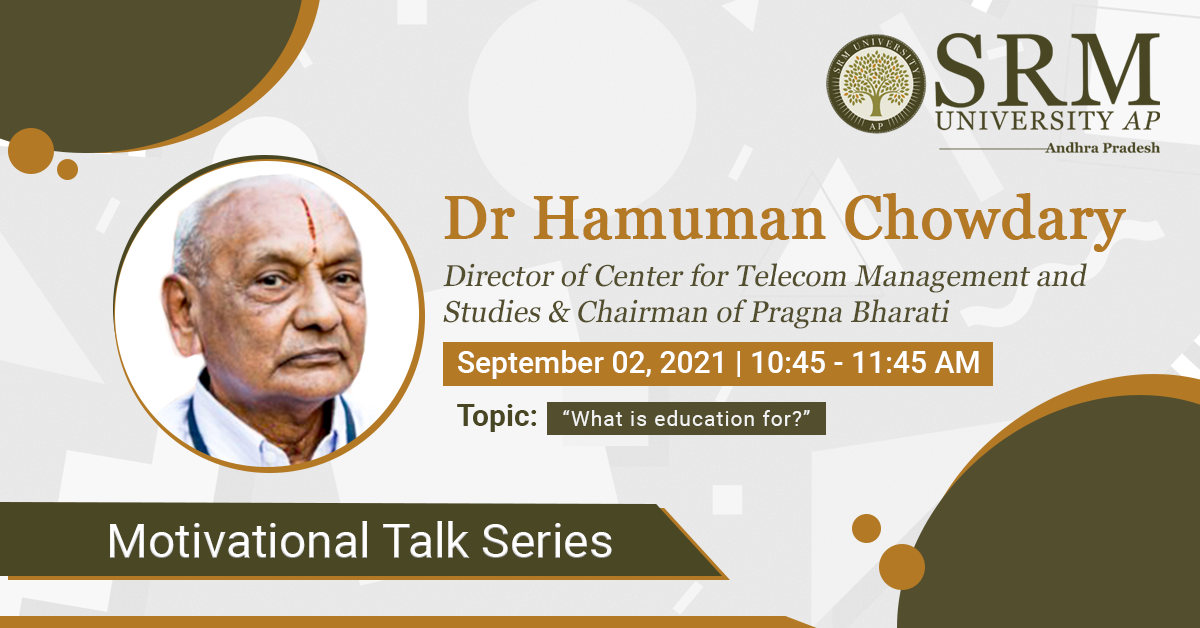 SRM University-AP, Andhra Pradesh, has beseeched Padma Shri awardee Dr T H Chowdary to deliver a motivational speech on “What is education for?” during the Freshmen Orientation Programme designed to welcome the Freshmen 2021 on September 02, 2021, at 10.45 am.
SRM University-AP, Andhra Pradesh, has beseeched Padma Shri awardee Dr T H Chowdary to deliver a motivational speech on “What is education for?” during the Freshmen Orientation Programme designed to welcome the Freshmen 2021 on September 02, 2021, at 10.45 am.Dr Chowdary is the Director of Center for Telecom Management and Studies, Hyderabad, along with being the Chairman of Pragna Bharati, Telangana & Andhra Pradesh. Further, he is the Convener of Bharatiya Dharma Rakshana Samakhya. A fellow of Tata Consultancy Services, Dr Chowdary has founded CMD, VSNL, and was the IT Advisor of the Government of Andhra Pradesh. His gamut of experience makes him the embodiment of knowledge who has been continuously contributing to the development of India. Join the session on September 02, 2021, at 10.45 am to learn from the multifaceted man himself.
Continue reading → - Captivating session with Mr VV Lakshminarayana August 26, 2021
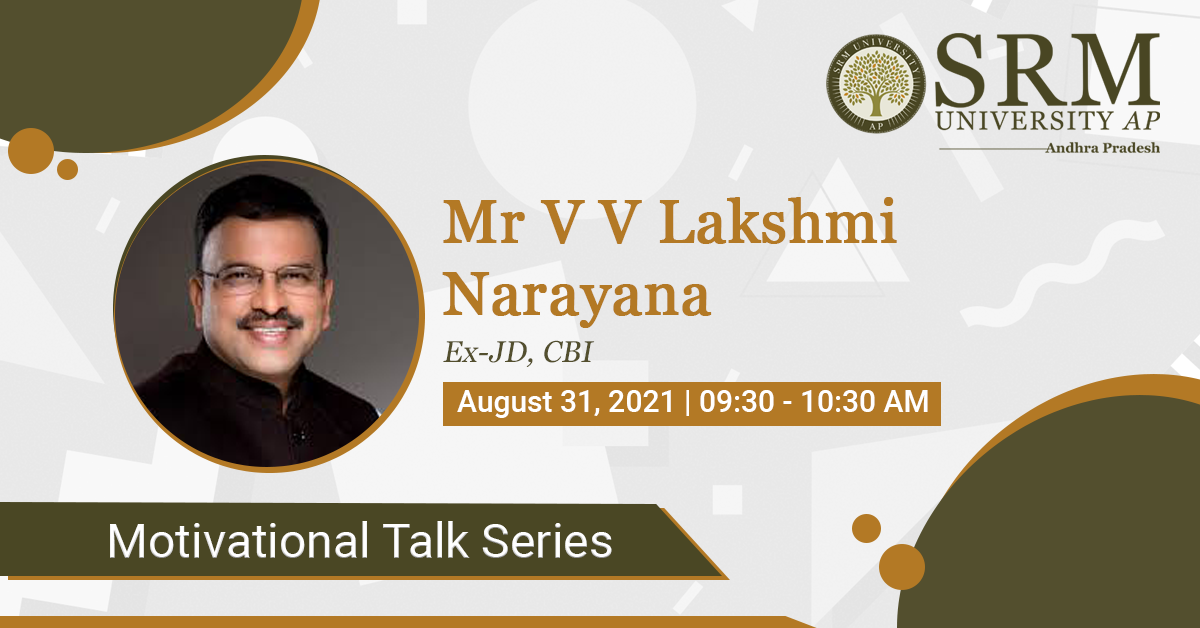 Progressing with the Freshmen Orientation Programme-2021, where students learn about the university systems and processes, SRM University-AP has also made arrangements to introduce them to eminent people from various spheres of society. The university is honoured to have Mr Vasagiri Venkata Lakshminarayana, Former Additional Director General of Police in Mumbai, Maharashtra, on August 31, 2021, at 09.30 am for an interesting discussion.
Progressing with the Freshmen Orientation Programme-2021, where students learn about the university systems and processes, SRM University-AP has also made arrangements to introduce them to eminent people from various spheres of society. The university is honoured to have Mr Vasagiri Venkata Lakshminarayana, Former Additional Director General of Police in Mumbai, Maharashtra, on August 31, 2021, at 09.30 am for an interesting discussion.Mr Lakshminarayana, a son of the soil, dedicated his life to the service of the nation. He is well-known for leading some high profile investigations with repute and valour. The Retired-IPS officer had previously held the posts of Joint Commissioner of Police of Thane, Maharashtra and Inspector general of police Rank under Y-category security for dealing with high-profile corruption cases. He has also worked under Anti-Terrorism Squad and CBI. Mr V.V. Lakshmi Narayana has been conferred with the Presidents Police Medal for Distinguished Services on January 26 2017.
He is known for his impactful speeches and interactions with youth that impels them towards maturity and development. He was an active member of the Lead India Foundation, which was started with the blessings of Dr APJ Abdul Kalam. Mr V.V. Lakshmi Narayana is also an avid blood donor. Moreover, as a part of his social duties towards the nation, he has adopted several villages that voluntarily prohibit alcohol – Chinnamandadi of Mahabubnagar District, Sahalalaputtuga of Srikakulam District and Seetharamapuram of Vizianagaram District are among them. He extensively travels in the villages of Andhra Pradesh to understand prominent issues, especially those of farmers, youth and women. Students are requested to avail the opportunity to welcome Mr Lakshminarayana to share his thoughts with us.
It is gracious moment to have him with us on August 31, 2021, at 09.30 am for an interesting discussion.
Continue reading → - Dr Varaprasad Reddy joins orientation programme to motivate students August 26, 2021
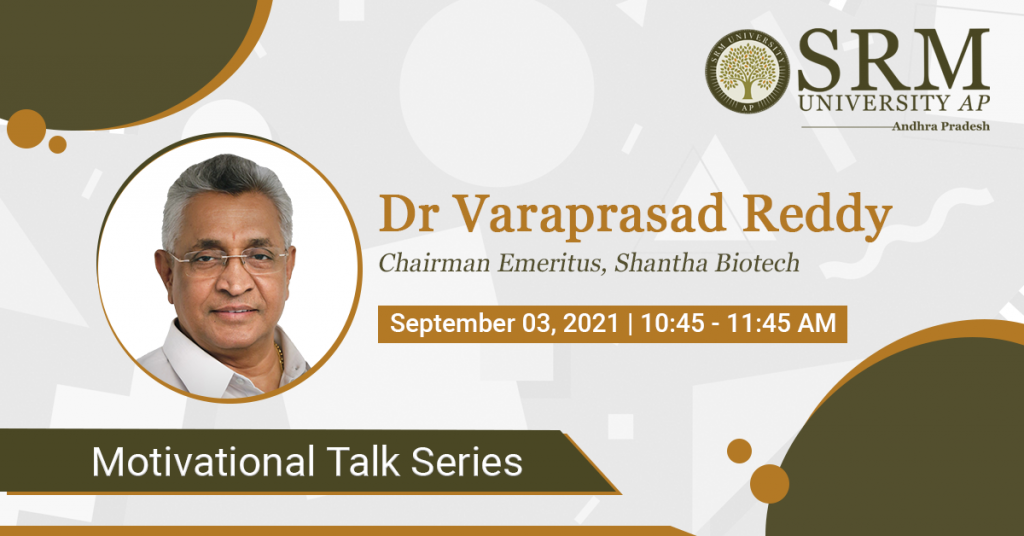 In the next chapter of the Freshmen Orientation Programme-2021, PADMA BHUSHAN Dr Varaprasad Reddy – Founder & Chairman of Shantha Biotechnics Ltd. will be joining us on September 03, 2021, at 10.45 am to meet and greet the new students.
In the next chapter of the Freshmen Orientation Programme-2021, PADMA BHUSHAN Dr Varaprasad Reddy – Founder & Chairman of Shantha Biotechnics Ltd. will be joining us on September 03, 2021, at 10.45 am to meet and greet the new students.Dr Varaprasad Reddy is a versatile personality who has excelled in various domains of science and technology, entrepreneurship, and industrial development. He is the founder of Shantha Biotechnics, a company that purposes to produce cost-efficient vaccines for the dwellers of India. Shantha Biotechnics developed India’s first ‘indigenously developed’ vaccine against Hepatitis-B, which was made available in the market at a much-reduced cost compared to the imported alternatives.
The credit is due to Dr Varaprasad Reddy and his vision for enabling India to become the leading manufacturer of vaccines. His fervour to contribute to the country won him several accolades, such as the coveted PADMA BHUSHAN award from the government of India and honorary ‘doctorate’ from various universities of repute. The Freshmen 2021 are encouraged to avail the opportunity of attending the session with the illustrious Dr Varaprasad Reddy on September 03, 2021, at 10.45 am, who would propel you towards brilliance and compassion.
Continue reading → - Resource and network-aware data placement algorithm for periodic workloads in cloud August 26, 2021
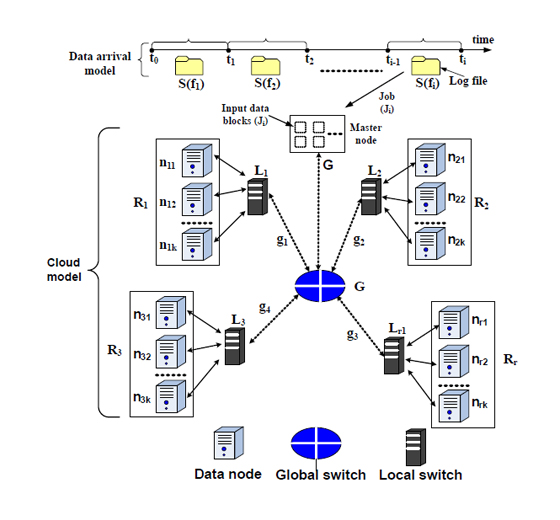 Dr Hirenkumar Thakkar from the Department of Computer Science and Engineering has published a research paper titled “RENDA: Resource and Network-aware Data Placement Algorithm for Periodic Workloads in Cloud” in the journal IEEE Transactions on Parallel and Distributed Systems Vol. 32, No. 12, pp. 2906-2920.
Dr Hirenkumar Thakkar from the Department of Computer Science and Engineering has published a research paper titled “RENDA: Resource and Network-aware Data Placement Algorithm for Periodic Workloads in Cloud” in the journal IEEE Transactions on Parallel and Distributed Systems Vol. 32, No. 12, pp. 2906-2920.Each year, tech giants are spending millions of dollars to purchase the resources to store the data. However, efficient data placement is a critical issue for companies that experience several terabytes of data generation on daily basis. With such speed of data generation, it is the need of the hour to come up with a strategy for an efficient storage mechanism. This research investigates the data placement problems in cloud data centres and assists several tech giants such as Google, Facebook etc., to manage the cloud resource properly.
This research benefits society with a lower cost of cloud subscriptions, as tech giants are able to save several thousands of dollars by means of an efficient storage mechanism. This ultimately enables the tech giants to offer cloud service subscriptions at a reasonable cost.
The study was carried out in collaborations with Artificial Intelligence and Big Data Computing Lab (ABC Lab), Chang Gung University, Taiwan with Prof. Prasan Kumar Sahoo and in collaboration with Prof. Bharadwaj Veeravalli from the National University of Singapore. In addition to the current collaboration, there are several collaborations with the Indian Institute of Technology (IIT-BHU) as well as the University of Tartu, Estonia.
In future, Dr Thakkar is planning to come up with a book on cloud resource management using Nature-inspired learning. In addition to that, there are few projects such as filing two separate patents on Healthcare data analysis and opinion feature mining in collaboration with Chang Gung University, Taiwan, the National University of Singapore, and the University of Tartu, Estonia.
Read the full paper here: https://doi.org/10.1109/TPDS.2021.3080582
Continue reading → - CSE students to transform the future through Accolite Digital August 25, 2021
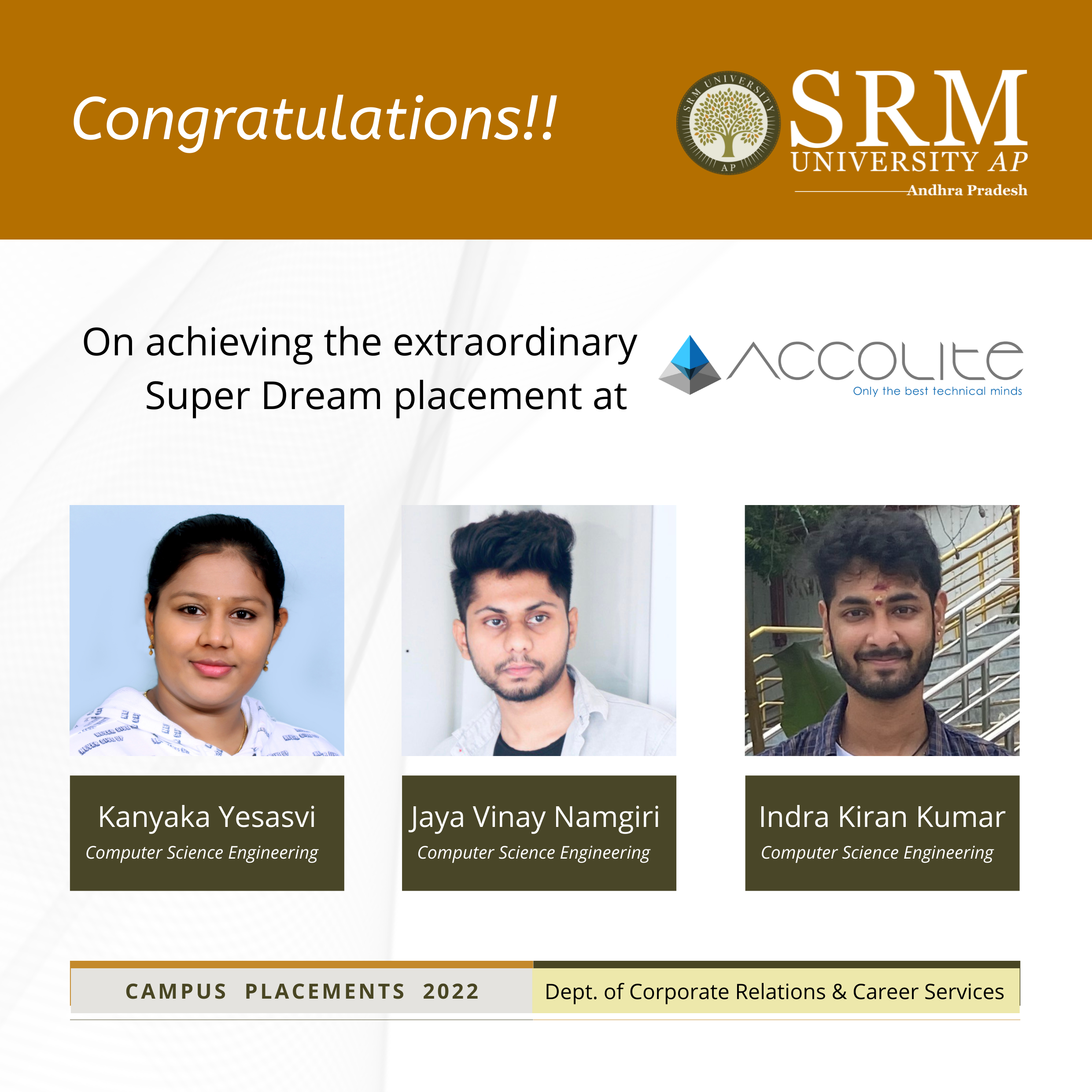 Kanyaka Yesasvi, Jaya Vinay Namgiri, Payeli Indra Kiran Kumar, three vibrant students from the Department of Computer Science Engineering get placed in the reputed digital and product engineering services and solutions company Accolite Digital with an exciting CTC of 11LPA.
Kanyaka Yesasvi, Jaya Vinay Namgiri, Payeli Indra Kiran Kumar, three vibrant students from the Department of Computer Science Engineering get placed in the reputed digital and product engineering services and solutions company Accolite Digital with an exciting CTC of 11LPA.Accolite Digital, founded in 2007, is a cutting-edge, best-in-class digital transformation services company that has successfully delivered design-driven challenging digital transformation efforts to Fortune 500 companies. They accomplish so by using a network of talented and passionate technologists to simplify their clients’ digital journeys through human-centric design and product innovation Accolite Digital is able to generate compelling business outcomes and when applied to any organisation, this encourages cross-team collaboration to drive transformed digital experiences. Their agile product innovation strategy speeds up design and development while offering a high return on investment.
The curriculum of SRM university-AP consists of training for placements beginning from the second year of graduate studies. It helps students to plan for the recruitment drive beforehand. The curriculum of placement consists of CCC training where students are divided into batches given individual attention on respective domains.
Let’s look into what our students say:
Kanyaka Yesasvi:
When I got to know that I received an offer in Accolite Digital as a software engineer I was overwhelmed with happiness. From July till date more than 80 companies visited us. Every day we are applying to multiple organisations through our placement cell. I am grateful to SRM University for giving me extraordinary opportunities to launch my career.Payeli Indra Kiran Kumar:
The CR&CS department gives training on all important aspects required for us to crack the placement, like coding classes, contests, mock interviews, mock GD etc. I started preparing for the interviews using the materials provided by CCC. The faculty in my CSE department helped in all possible ways that they can. I suggest to juniors to make use of all the opportunities provided by the university and learn core subjects like DSA, OS, DBMS and CN for cracking super dream placement offers.Jaya Vinay Namgiri:
Continue reading →
Acceleration bootcamp provided by CCC helped me brush up on my coding skills and made me ready to face the companies in the Placement drive 2022. I thank the placement team for providing a helpdesk virtually in spite of this covid situation. That cleared all my doubts and helped me to plan accordingly. I would like to suggest my juniors develop any one project of their interest every year so that at the end of the third year they will be ready to face the recruitment drive. - Founders Day Celebration 2021 August 25, 2021
New Indian Express – August 25
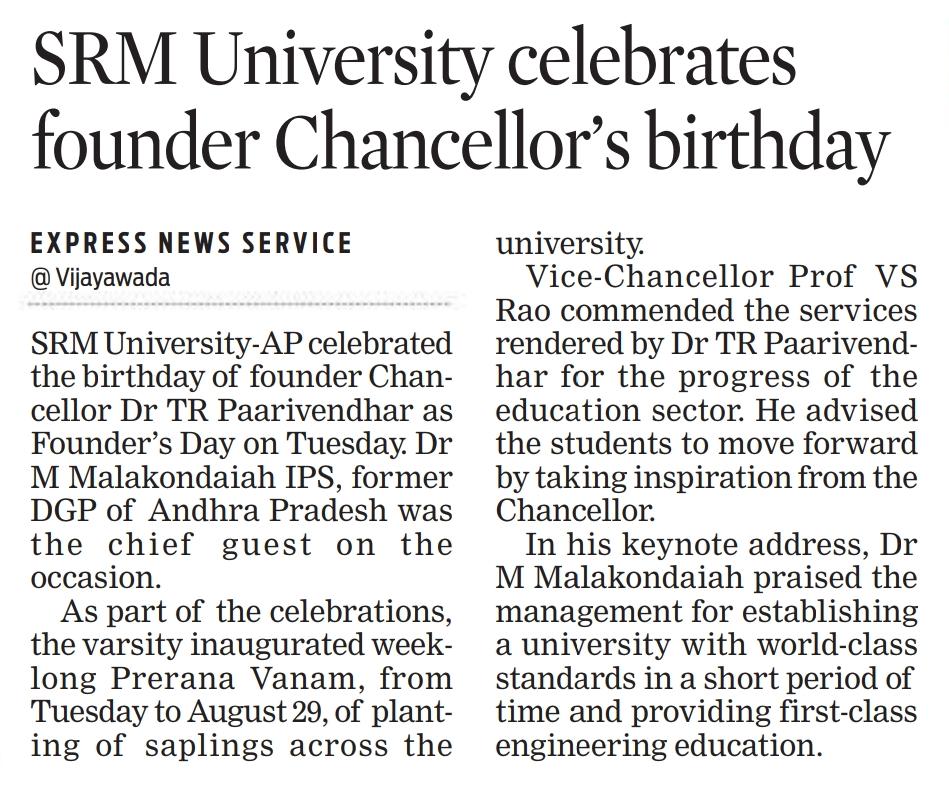
Daily Pioneer – August 25

Andhra Prabha – August 25
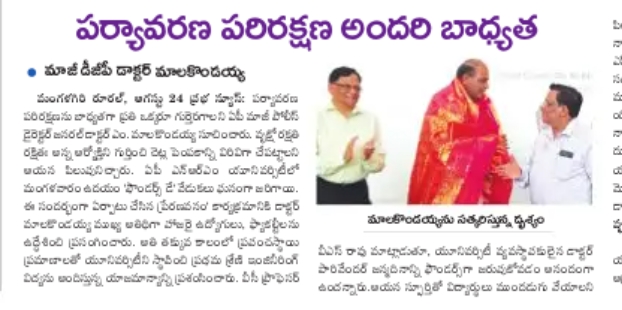
PrajaSakthi – August 25
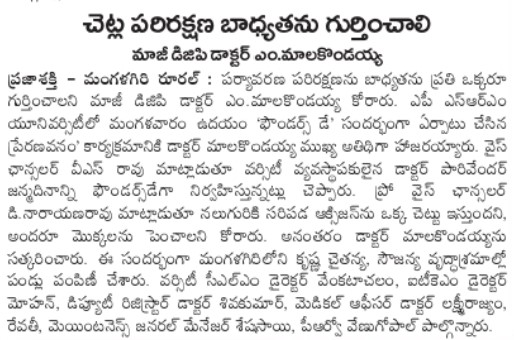
Sakshi – August 25
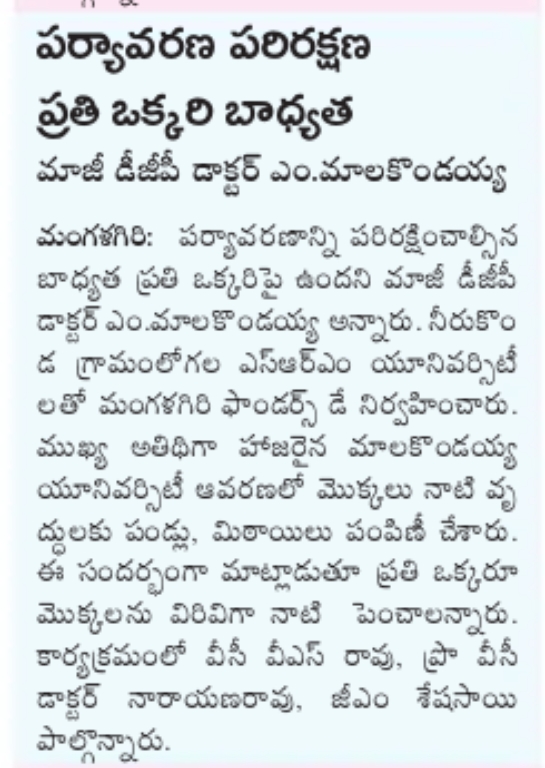
Surya – August 25
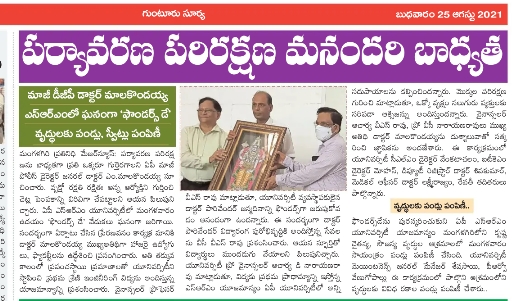
Vartha – August 25
Continue reading →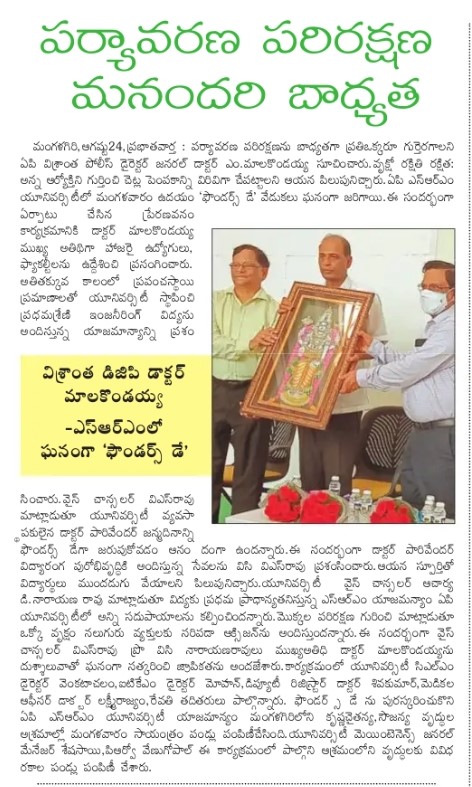
- Prof B S Murty to inspire Freshers-2021 August 25, 2021
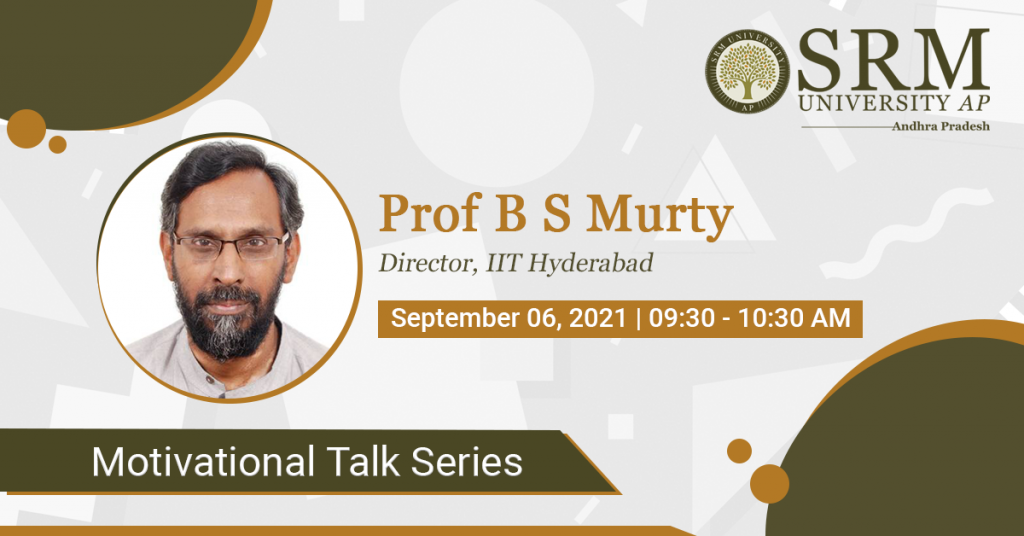 To grace the Freshmen Orientation Programme-2021 even further, Prof B S Murty, Director of the Indian Institute of Technology, Hyderabad, will be delivering an inspiring talk to the freshers of this academic season on September 06, 2021, at 9.30 am.
To grace the Freshmen Orientation Programme-2021 even further, Prof B S Murty, Director of the Indian Institute of Technology, Hyderabad, will be delivering an inspiring talk to the freshers of this academic season on September 06, 2021, at 9.30 am.Prof B S Murthy is an Indian metallurgist who has been recognised with the Shanti Swarup Bhatnagar Award for Science and Technology in 2007, the highest science award in India. Formerly, he was the Head of the Department at the Indian Institute of Technology, Madras, after being the Professor at the Indian Institute of Technology, Kharagpur. The celebrated scientist will explain the future of research in science and technology and how students should prepare themselves from their undergraduate days.
Continue reading → - SRM University-AP initiates Prerana Vanam on Founder’s Day August 25, 2021
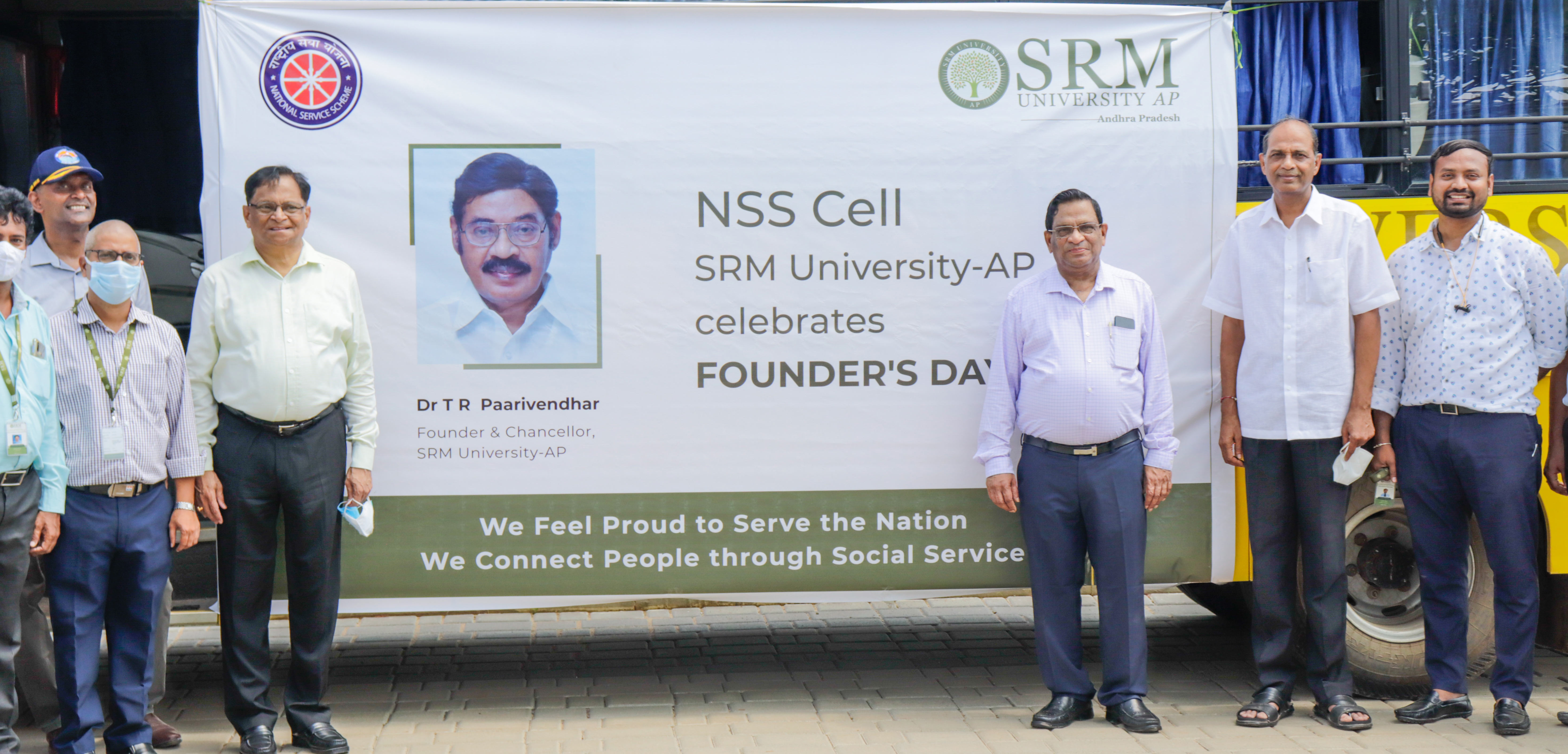 SRM University-AP celebrated the birthday of Founder Chancellor Dr T R Paarivendhar as Founder’s Day on August 24, 2021. Dr M Malakondaiah IPS, former Director-General of Police, Andhra Pradesh, was the chief guest of the day. The inauguration of Prerana Vanam, a week-long (Aug 24-29) event of planting trees across the university is being held as part of the celebrations. Prof V S Rao, Vice-Chancellor; Prof D Narayana Rao, Pro-Vice-Chancellor; Dr Vinayak Kalluri, Registrar; and Wg Cmdr Venkataachalam Sekkappan, Director-CLM addressed the gathering.
SRM University-AP celebrated the birthday of Founder Chancellor Dr T R Paarivendhar as Founder’s Day on August 24, 2021. Dr M Malakondaiah IPS, former Director-General of Police, Andhra Pradesh, was the chief guest of the day. The inauguration of Prerana Vanam, a week-long (Aug 24-29) event of planting trees across the university is being held as part of the celebrations. Prof V S Rao, Vice-Chancellor; Prof D Narayana Rao, Pro-Vice-Chancellor; Dr Vinayak Kalluri, Registrar; and Wg Cmdr Venkataachalam Sekkappan, Director-CLM addressed the gathering.In his address, Vice-Chancellor Prof V S Rao commended the services rendered by Dr T R Paarivendhar for the progress of the education sector. He advised the students to move forward by taking inspiration from the Chancellor. In his keynote address, Dr M Malakondaiah praised the management for establishing a university with world-class standards in a very short period of time and providing first-class engineering education. He also appreciated the Prerana Vanam endeavour that aims to promote greenery on the campus. “We all have a responsibility to protect and nourish the environment and I am glad that SRM AP is showing the appropriate way”, he added. Speaking on the occasion, Pro-Vice-Chancellor, Prof D Narayana Rao paid tributes to the leadership of Hon’ble Chancellor. He further explicated the benefits of growing trees and how that sustainably contributes to the oxygen level in the atmosphere.
Prerana Vanam is an initiative by SRM University-AP to fundamentally raise awareness among people about the importance of ecosystem preservation. This dream project of growing a diversified genus of trees across the university campus was named by Mr SP Sesha Sayee Kumar, General Manager, GPEMC. The formal event held in the university was attended by staff and faculty of the university and the distinguished guests inaugurated Prerana Vanam by planting tree saplings on the campus.
The celebration continued with the staff visiting the elderly at nearby Old Age Homes in Mangalagiri. Prof V S Rao lauded the gesture of the university that extends services to society. Dr Sivakumar, Deputy Dean Academic Affairs; Dr K Mohan, Director, ITKM and Corporate Communications; Dr Ch Lakshmi Rajyam, Medical Officer; and Ms Revathi Balakrishnan, Assistant Director- Student Affairs; Mr Venugopal, Media PRO were present on the occasion.
As part of the service activities to mark Founder’s Day, the NSS Department distributed masks and sanitisers for two days. Former DGP Dr Malakondayya formally started the distribution of the masks on August 24, Tuesday morning, and the university staff continued it to Wednesday as well. The university NSS coordinator Dr Lakshmana Rao and program officer Dr Parthasarathy informed that masks and sanitisers were handed over to cart traders, auto drivers, workers and to the elders at the Krishna Chaitanya Ashram in Mangalagiri town. Precautions to be taken to prevent corona infection were explained to the agricultural labourers in Kuragallu, Nirukonda and Nidamarru villages. Ms Revathi Balakrishnan, Mr Narendra Babu and several NSS volunteers participated in these activities.
Continue reading → - Learn the tricks to calm and organise your mind with Ragini Mathur August 24, 2021
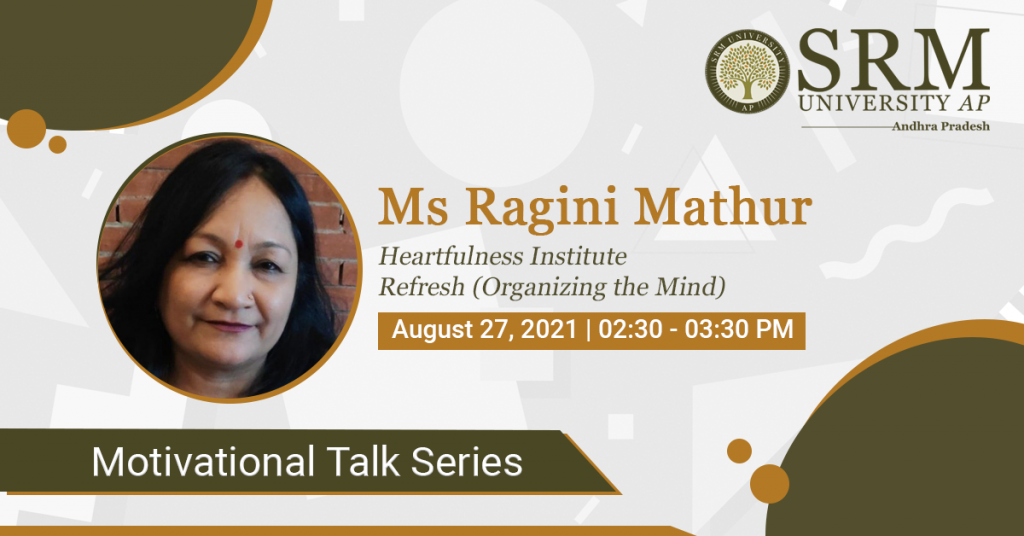 The well-designed Freshmen Orientation Programme-2021 not only gives an overview of the university systems and process but also provides a gateway to holistic development for the students. Progressing with the orientation programmes, the second session on the mindfulness of the students has been planned in collaboration with Heartfulness Institute for August 27, 2021, at 2.30 pm. Ms Ragini Mathur, one of the dedicated trainers of Heartfulness Institute, will enlighten the students on “Refresh (Organizing the Mind)”.
The well-designed Freshmen Orientation Programme-2021 not only gives an overview of the university systems and process but also provides a gateway to holistic development for the students. Progressing with the orientation programmes, the second session on the mindfulness of the students has been planned in collaboration with Heartfulness Institute for August 27, 2021, at 2.30 pm. Ms Ragini Mathur, one of the dedicated trainers of Heartfulness Institute, will enlighten the students on “Refresh (Organizing the Mind)”.Ms Ragini Mathur started her career as a Government teacher. She later got selected in Central Railways in RE Project. She secured promotion and became Divisional Railway Manager for the Bhopal Region. After taking voluntary retirement from Railway Services, she worked as an Administrative Office Superintendent. She joined Heartfulness Institute more the two and half decades ago and became a trainer in 2011. The versatile Ms Mathur has also worked as a radio jockey and a casual announcer for Yuvvani Programme in Akashvani. At present, she is working as a Campus Connect Coordinator for the Heartfulness Institute.
Join the session on August 27, 2021, at 2.30 pm to learn the tricks to calm and organise your mind from the expert herself.
Continue reading →


